M AR t I n Sh AW
Song S

Sophie Bevan soprano
Andrew Kennedy tenor
Roderick Williams baritone
Iain Burnside piano


Sophie Bevan soprano
Andrew Kennedy tenor
Roderick Williams baritone
Iain Burnside piano
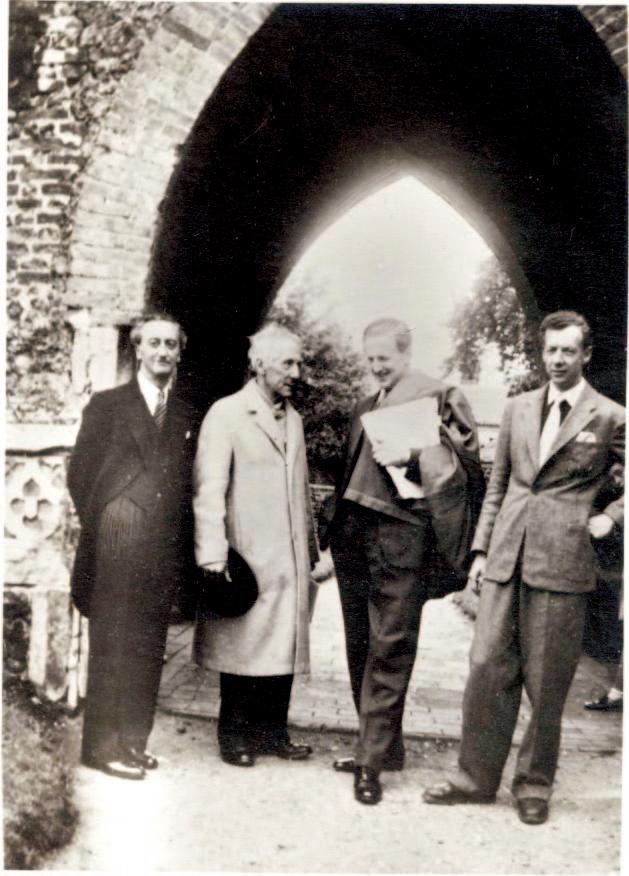
To the inquisitive pianist, there is nothing more enticing than a large manila envelope on the doormat, filled to bursting with unknown music. George Odam had already enthused about Shaw’s music and tantalised me with peek-a-boo glimpses, but when I took my manila envelope over to the piano I had little idea what to expect. In fact, I’d unwittingly sung some Shaw myself, decades before, at interminable school assemblies. The hymn Hills Of The North, Rejoice is no bad introduction to this remarkable composer: a tune which, once belted out, is never forgotten; a tune constructed with great skill, made to be sung.
This singability was one of my first reactions to Shaw’s songs. Another was his energy: there are more fast songs on this disc than you’ll find from any of his more acclaimed, less vigorous contemporaries. Fitting Shaw into the musical jigsaw isn’t as simple as it might seem. With the exception of his Yeats setting The Land Of Heart’s Desire there is little modal harmony. There are no Shropshire Lads, no blue remembered hills. Instead Shaw takes us to Romney Marsh in Kent, to BabLock-Hythe in Oxfordshire. His vision of rural England is coloured by occult preoccupations.
‘The covert is full of noises,’ we learn in Wood Magic , ‘and the stir of nameless things.’ This startlingly original song presents a stark choice between pagan and Christian. The contrast between Shaw’s dark subterranean rumble and a distinctly four-square hymn tune suggests where his heart lay.
Perhaps Shaw’s greatest achievement, though, is his military songs. They span both World Wars and honour all three services. They honour women too: Shaw’s ash-blonde Waaf in Jack Overdue is surely among his most touching creations, stuck back at base, contemplating her tea-leaves. By choosing poems from, and poets who were soldiers and airmen on active service, Shaw flags up an unashamedly populist agenda. His songs are not meant to be difficult, to listen to or perform. In their sincerity I find a musical counterpart to classic WW2 movies like Reach For The Sky or The Dambusters. Those films have entered our national bloodstream. I’d love to think that, now that they’ve been rescued from dusty library shelves, Shaw’s songs might enter it too.
1 Venizel Short Roderick Williams [2:44]
2 Jack Overdue Pudney Sophie Bevan [1:40]
3 The Melodies You Sing Bax Andrew Kennedy [1:08]
4 The Airmen Armour Roderick Williams [2:59]
5 Over The Sea C. Rossetti Sophie Bevan [1:37]
6 Pity The Poor Fighting Men Kipling Andrew Kennedy [2:32]
7 The Egg-Shell Kipling Roderick Williams [1:42]
8 The Land Of Heart’s Desire Yeats Sophie Bevan [2:11]
9 The Conjuration Hung-So-Fan Andrew Kennedy [2:04]
10 The Merry Wanderer Shakespeare Sophie Bevan [1:21] 11 Bab-Lock-Hythe Binyon Andrew Kennedy [2:24] 12
Delphian Records gratefully acknowledges support from the following in making this recording:

Recorded on 1-3 May 2011 in the Sir Michael Tippett Centre, Bath Spa University
Producer and Engineer: Paul Baxter
24-bit digital editing: Adam Binks
24-bit digital mastering: Paul Baxter
Piano: Steinway
Piano Technician: Steve Burden


Design: John Christ
Booklet editor: Henry Howard
Cover image: Anon., A Lancaster Bomber
Crew © The Bridgeman Art Library
Photo credits: ????
Delphian Records Ltd – Edinburgh – UK www.delphianrecords.co.uk
Most people have either never heard of Martin Shaw and his work or, at best, know him as a composer and arranger of Anglican religious music that is mostly now rarely performed. His work with Rev. Percy Dearmer in 1925 in editing the hymn book Songs Of Praise, aimed at schools, and their Oxford Book Of Carols of 1928, helped to establish a musical foundation for many young people in the years immediately preceding and following the Second World War. His pairing of Eleanor Farjeon’s words Morning Has Broken with an old Celtic carol melody grew to be one of the most popular spiritual songs in the second half of the twentieth century, eventually making it into the Hit Parade. His stirring hymn tunes to the words Hills Of The North, Rejoice (Little Cornard) and Through The Night Of Doubt And Sorrow (Marching) have stayed in the memory of many from their schooldays, and, still loved by choirs and congregations today, can often move even some of the less religiously inclined.
Martin Fallas Shaw was born in Camberwell, London in 1875, the son of a church organist and music teacher. Having dropped out of his course at the Royal College of Music, he followed in his father’s footsteps and for much of his life he remained a musician working for the Anglican Church. To the outside observer this may seem an unexceptional life and, had it not been for his autobiographical memoirs, published in 1928 under the title Up To Now by
the Oxford University Press, it is likely that his life and work would have remained obscure. Up To Now is remarkable, first in that it is one of the very few autobiographies of an English composer and working musician, second in its candour and witty writing and third that it gives a lively first-hand account of bohemian artistic life in London at the turn of the nineteenth and twentieth centuries, showing many aspects of Shaw’s character and work that are surprising and vividly engaging. Shaw, incidentally, seems never to have let his serious facial disfigurement (a naevus or port-wine stain that covered the whole of his left face) hold him back, but this in part accounts for the lack of photographs of him that exist, and of the right profile view in those that do.
A chance meeting in his favourite Suffolk seaside town of Southwold, where his family had resorted regularly for holidays ever since he was a babe in arms, changed Shaw’s life and acted as a catalyst for his artistic creativity. There in 1898, he met 26-year-old Edward Gordon Craig, son of the actress Ellen Terry, and they formed a deep and life-long friendship. The remarkable relationship between Ellen Terry and Henry Irving has been recorded in many places, but most recently in Michael Holroyd’s book A Strange Eventful History (Chatto & Windus, 2008). When this is read in conjunction with Shaw’s own writing, another layer of Shaw’s life appears that remains
unspoken in the composer’s own text, since his fate became entwined with this exceptional family.
After their Southwold meeting, the two young men found accommodation together in Hampstead, where Shaw’s father had been organist, and Craig introduced Shaw to his bohemian London circle. They began work together on a series of projects, the most fruitful being, in 1900, the first commercial production of Henry Purcell’s opera Dido And Aeneas since Purcell’s death. To fund this enterprise Shaw set up a Purcell Operatic Society, and his championing and editing of Purcell singles him out for special interest in the light of future developments in English music. Soon after this, Craig left the country to work with – and become the lover of – Isadora Duncan, the pioneering American dancer, with whom he was to father a child. At Craig’s invitation, a then penniless Shaw joined them in Berlin as musical director to the company, and travelled with them in many European countries over the next year and a half. Returning to England, Shaw was rescued once again from destitution, this time by his lifelong friend from student days, Ralph Vaughan Williams, at whose recommendation he was appointed Director of Music at St Mary’s, Primrose Hill under the radical thinker Dr Percy Dearmer. This alliance led to several publications, but it was the start of the First World War in August
1914 that unlocked the hidden solo song composer in him. Over the next forty years Shaw was to write over seventy songs for solo voice and piano, set to texts by a variety of poets, and very few of them on religious themes. Including those songs written for massed singing and schools, they account for more than half his catalogue of just over 300 items. Shaw’s songs lie nearest to his heart and show him at his most open and intimate.
He was somewhat caught up in the new spirit of Christian Socialism and used his skills as a composer to write for amateur performers, both encouraging congregational and choral singing within parish churches and creating repertoire for newly-formed secular, mixedvoice choirs in the community. Another student-days friend, John Ireland, also an organist and church musician, who was best man at Shaw’s wedding, shared Shaw’s interest in song writing and the two sometimes met to share and criticize each other’s work.
(Shaw’s marriage in 1916 to Joan Cobbold, by all accounts a formidable lady, provided him with the stability and a family life that he very much needed.) Unlike Ireland, Shaw was not much attracted to the introspective and dreamy world of nostalgic lyrical fantasy or the musical world of impressionism. Shaw’s music deals in directness of expression and immediate engagement with the audience. His piano writing lacks the facility, depth or
subtle range of Ireland’s, yet he aims for a partnership between singer and accompanist that is perfectly balanced and where the words have the maximum chance to be heard and understood. There is rarely a long pianistic introduction or final peroration: often the two performers start and end together, in a simplicity of purpose that is a hallmark of Shaw’s work. A supreme melodist, he hits upon effective and often very simple tunes that stick in the head forever. Andrew Kennedy, for whom Shaw’s songs were a new discovery, told me:
United Arts Rifles and wrote amusingly about being sent to guard the Albert Hall and feeling that he would have preferred to destroy both it and the memorial opposite rather than guard it! Another of his contributions to the war effort was to publish a set of songs called Six Songs Of War. The first four songs are jingoistic ballads and thump their tubs in the manner approved by music-hall artists and luncheon club singers of the time. Number 5 , Carillons, has some musical merit and interest, but it is the sixth song Venizel that shows Shaw’s best qualities emerging.
will lead to the brilliant settings of Wilfred Owen in Britten’s War Requiem.
During the Second World War Shaw again stands out as one of the few composers of the time to tackle the subject of the war directly. His exciting and highly dramatic 1941 setting of Margaret Armour’s The Airmen, written about and during the Battle of Britain, and his touching vignette to a poem of John Pudney, Jack Overdue (1942), both provide a direct insight into those times.
I was struck by how technically competent his compositions were and also by the broad range of styles and tempi in his music. He has a good understanding of the effects his songs have on the listener and as a result they have an immediacy and freshness that makes them very easy to interpret and perform…
Shaw wrote:
The feelings inspired by the beginning of the war stirred me afresh to composition, which I had almost abandoned. I wrote six Songs of War – mostly settings of verses from The Times. John Ireland liked these and thought one of them – Venizel – my best song…
All the songs in this collection were published, most often as soon as they were written. Indeed, in Up To Now Shaw claims to have been one of the first composers who stimulated publishers to publish new songs that departed from the fashionable ‘two-shilling shop-ballad’ style that Shaw detested.
When the call to arms came in August 1914, Martin Shaw volunteered but was turned down at the medical examination and ‘relegated to the reserve’. Instead he joined the voluntary
Shaw’s habit of searching The Times for new poems seems largely to have let him down in this set, except for Venizel. This proves to be interesting both aesthetically and historically, since it was written by a soldier on active service at the front in the first weeks of the war. The poet was Captain W.A. Short who wrote it in northern France in September 1914. This superb song is of great historic significance and sets out upon a path that, in melodic contour and in simplicity and directness of expression,
Shaw’s own favourite of all his song settings was Summer (1917), one of several settings of poems by Christina Rossetti. The songs on pagan subjects equal any Christian ones: the eerily pantheistic Wood Magic (1924) and the atmospheric Perilous Ways (1932) add mystery to the work of this church organist while also perhaps revealing something of Shaw’s inner life. His Shakespeare settings make interesting comparison with those of several of his contemporaries, and I Know A Bank (1922) has a memorable melodic simplicity and tenderness. Together with this, Merry Wanderer (1922) reminds us of Shaw’s appreciation of Shakespeare’s A Midsummer Night’s Dream, of which he made a children’s musical version Fools And Fairies in 1918. Shaw’s loves, of the sea and of horse-riding come through in several of the songs, including the vigorous setting of a poem by Percy
Dearmer’s son Geoffrey, Child Of The Flowing Tide (1919). A further link with Britten is in Shaw’s British folk song settings, with their charming and subtly decorative piano accompaniments, such as Ye Banks And Braes (1925) and The Banks Of Allan Water (1924) that were written two decades before Britten’s own. The children’s poem Cuckoo set and added to by Shaw in 1915 was set again by Britten in Friday Afternoons (1935) in similar vein Britten knew Shaw’s music and Shaw’s brother Geoffrey had been very influential in setting up the music department at Gresham’s School that Britten was later to attend. Martin often visited the school and gave lectures there. Britten certainly thought well enough of his music to invite him to write for the 1948 Aldeburgh Festival – the first ever composer so commissioned – and the very first Aldeburgh concert featured Shaw’s anthem God’s Grandeur. Martin Shaw retired to Southwold and died there in 1958.
George Odam © 2011
Composer, conductor and writer George Odam is Emeritus Professor of Bath Spa University and a Fellow of the Guildhall School of Music and Drama where he was Head of Research and Staff Development until 2007.
1 Venizel (1914)
Let me go back to Venizel
And farther still across the plain, A garden grows beside the Aisne
With sweet black plums that like me well.
Beyond the bridge at Venizel
The sunny level plain is laid.
Last week we crossed, and had for shade
The yellow bursts of German shell.
And once again at Venizel
My boys the Prussian fire withstood, Stout hearts still sleep within the wood, Beside the bridge for which they fell.
Let us go back to Venizel:
To Bucy highlands let us win.
The road is northward to Berlin
And our advance the Prussian’s knell.
Captain W.A.
(d.1917) ‘an officer in charge of a battery at the front’ Published in The Times, September 1914
2 Jack Overdue (1942)
Come back, come back, you Jolly Jack Straw. There’s ice in the killer sea.
Weather at base closes down for the night: And the ash-blonde Waaf is waiting tea.
How many long Atlantic hours
Has he hunted there alone: Has he trimly weaved on the silent air The dullest patrol that’s ever flown.
How can they know he found at last, That he made a hunter’s strike: And swooped on a sly swift shark as it dived: Saw gouting oil mount carpet like?
Jolly Jack Straw is beating it back, But his wireless set is blown. He cannot report his long sought luck, Or the ice-dark blinding the eye and bone.
Come back, come back you Jolly Jack Straw
For the ash-blonde Waaf drinks tea: And the tea-leaves tell her fortune as well. Come back, come back from the killer sea.
Flight Lieutenant John Pudney (1909-1977) In Dispersal Point and Other Air Poems, J Lane, 1942
3 The Melodies You Sing (1933)
The melodies you sing Are gone as soon as heard; And beauty, like a bird, Loveliest on the wing.
Before we learn from age, We try, as girl and boy, To catch our flying joy And keep it in a cage.
For joy, that cannot stay, To linger is to die; And we, without a sigh, Should let it float away.
Clifford Bax (1886-1962)
From Farewell My Muse, L. Dickson, 1932
4 The Airmen (1941)
Have you heard those birds of the morning
That rise with the lark’s first flight?
Have you seen those birds of shadow That pounce with the owl at night? They swoop where Hell is flaming, They soar in Heaven apart. They fly with the swallow’s swiftness And fight with the eagle’s heart.
Have you seen their glinting feathers? They are off to the fields of Fate, Where the flowers all wear scarlet And the rivers red are in spate. To prick new names of glory
On valour’s ancient chart, They fly with the swallow’s swiftness, And fight with the eagle’s heart.
Have you heard their thrumming music? It drones to the cannon’s boom, And the wailing whiz of shrapnel Like an undersong of doom. Wherever in loudest chorus
The deafening thunders start, They fly with the swallow’s swiftness, And fight with the eagle’s heart.
And though some of the first and fleetest Have flown away to the west, And sunk on the seas of twilight; With a wound in their shining breast, The others know that, homing, In the end all birds depart, And they fly with the swallow’s swiftness, And fight with an eagle’s heart.
Have you seen those birds of the morning That rout the carrion crow?
Have you seen those birds of shadow That pounce on the stoat below? Till Hell recalls its legions, And Death lays down his dart, They’ll fly with the swallow’s swiftness And fight with the eagle’s heart.
Margaret Armour (d.1943)
Published in The Times, 28 May 1940
5 Over The Sea (pub. 1917)
Oh what comes over the sea, Shoals and quick sands past And what comes home to me, Sailing slow, sailing fast?
A wind comes over the sea
With a moan in its blast, But nothing comes home to me, Sailing slow, sailing fast.
Let me be! Let me be,
For my lot is cast Land or sea all’s one to me And sail it slow or fast.
6 Pity The Poor Fighting Men (1919)
All the world over, nursing their scars, Sit the old fighting-men broke in the wars –Sit the old fighting-men, surly and grim Mocking the lilt of the conquerors’ hymn.
Dust of the battle o’erwhelmed them and hid. Fame never found them for aught that they did.
Wounded and spent to the lazar they drew, Lining the road where the Legions roll through.
Sons of the Laurel who press to your meed, (Worthy God’s pity most – you who succeed!)
Ere you go triumphing, crowned, to the stars, Pity poor fighting-men, broke in the wars!
Rudyard Kipling (1865-1936)
7 The Egg-Shell (1919)
The wind took off with the sunset –The fog came up with the tide, When the Witch of the North took an Egg-shell
With a little Blue Devil inside.
‘Sink,’ she said, ‘or swim,’ she said,
‘It’s all you will get from me.
And that is the finish of him!’ she said, And the Egg-shell went to sea.
The wind fell dead with the midnight, The fog shut down like a sheet, When the witch of the North heard the Egg-shell Feeling by hand for a fleet.
‘Get,’ she said, ‘Or you’re gone,’ she said,
But the little Blue Devil said ‘No!
The sights are just aiming on;’ he said, And he let the Whitehead go.
The wind got up with the morning, And the fog blew off with the rain, When the Witch of the North saw the Egg-shell
And the little Blue Devil again.
‘Did you swim?’ she said. ‘Did you sink?’ she said,
And the little Blue Devil replied:
‘For myself I swam, but I think,’ he said, ‘There’s somebody sinking outside.’
Rudyard Kipling (1865-1936)
In Traffics and Discoveries: Their Lawful Occasions, Collier’s Magazine, 1903
8 The Land Of Heart’s Desire (1917)
The wind blows out of the gates of the day, The wind blows over the lonely of heart, The lonely of heart must wither away.
While the fairies dance in a place apart, Shaking their milk-white feet in a ring Tossing their milk-white arms in the air.
For they hear the wind laugh, and even the wise are merry of tongue, But I heard a reed of Coolaney say, When the wind has laugh’d and murmur’d and sung
The lonely of heart must wither away.
W.B. Yeats (1865-1939)
9 The Conjuration (1925)
Soft night, clear moon, perfume of plum-trees, stream
Thro’ my beloved’s dream.
Conjure her nestling heart to love me more, And charm her to my door.
O plum-tree perfume, and O moon, O night, Her kiss will tell me ere the dawn is bright
If ye have heard aright.
after the Chinese of Hung-So-Fan (1812-1861)
10 The Merry Wanderer (pub. 1922)
Thou speak’st aright; I am that merry wanderer of the night. I jest to Oberon and make him smile
When I a fat and bean-fed horse beguile, Neighing in likeness of a filly foal: And then the whole quire hold their hips and laugh, And waxen in their mirth and neeze and swear
A merrier hour was never wasted there.
And sometime lurk I in a gossip’s bowl, In very likeness of a roasted crab, And when she drinks, against her lips I bob And on her wither’d dewlap pour the ale. And then the whole quire hold their hips and laugh, And waxen in their mirth and neeze and swear
A merrier hour was never wasted there.
The wisest aunt, telling the saddest tale, Sometime for three-foot stool mistaketh me; Then slip I from beneath, down topples she, And ‘tailor’ cries, and falls into a cough; And then the whole quire hold their hips and laugh, And waxen in their mirth and neeze and swear A merrier hour was never wasted there.
William Shakespeare (1564-1616)
From A Midsummer Night’s Dream (adapted)
11 Bab-Lock-Hythe (pub. 1919)
In the time of wild roses
As up Thames we travelled Where ’mid water-weeds ravelled The lily uncloses,
To his old shores the river
A new song was singing, And young shoots were springing On old roots for ever.
Dog-daisies were dancing, And flags flamed in cluster, On the dark stream a lustre Now blurred and now glancing.
A tall reed down-weighing, The sedge-warbler fluttered; One sweet note he uttered, Then left it soft-swaying.
High woods, heron-haunted, Rose, changed, as we rounded
Old hills greenly mounded, To meadows enchanted.
Till sunset was rimming
The West with pale flushes; Behind the black rushes
The last light was dimming;
In cloud of gray weather
The evening o’erdarkened, In the stillness we hearkened; Our hearts sang together.
Laurence Binyon (1869-1943) from England and Other Poems, E. Matthews, 1909
12 Child Of The Flowing Tide (1919)
Away to the call of the racing sea –
(Child of the flowing tide)
A hundred chargers of ivory, And two of them saddled for you and me, Are pawing and stamping the surf to be free
Where the wild seahorses ride.
The deep waters shall roar as we race to the shore
On the back of the flowing tide.
O hurry the moon is away in the sky
(Child of the flowing tide)
With your heels well down and your heart set high
You’re saddled and bridled and so am I;
So gather your reins, for the foam will fly
Where the wild seahorses ride.
Grip tight with your knees as you gallop the seas
On the back of the flowing tide.
On the wide lagoon I’ll meet you tonight
(Child of the flowing tide)
When the moon swings high and the stars are alight
And the roaring sea chargers are ready to fight, Their manes are all foam and their coats all white
Where the wild seahorses ride.
The deep waters shall roar as we race to the shore
On the back of the flowing tide.
Geoffrey Dearmer (1893-1996)
In Poems, William Heinemann, July 1918
13 Full Fathom Five (pub. 1923)
Full fathom five thy father lies; Of his bones are coral made; Those are pearls that were his eyes; Nothing of him that doth fade, But doth suffer a sea-change Into something rich and strange. Sea-nymphs hourly ring his knell: Ding-dong.
Hark! now I hear them – Ding-dong, bell.
Shakespeare From The Tempest
14 Bird Or Beast? (pub. 1917)
Did any bird come flying After Adam and Eve, When the door was shut against them And they sat down to grieve?
I think not Eve’s peacock Splendid to see, And I think not Adam’s eagle; But a dove may be.
Did any beast come pushing Through the thorny hedge Into the thorny, thistly world Out from Eden’s edge?
I think not a lion, Though his strength is such; But an innocent loving lamb May have done as much.
If the dove preached from her bough And the lamb from his sod, The lamb and the dove Were preachers sent from God.
Christina Rossetti
15 The Little Waves Of Breffny (pub. 1924)
The grand road from the mountain goes shining to the sea,
And there is traffic on it and many a horse and cart,
But the little roads of Cloonagh are dearer far to me
And the little roads of Cloonagh go rambling through my heart.
A great storm from the ocean goes shouting o’er the hill,
And there is glory in it; and terror on the wind: But the haunted air of twilight is very strange and still,
And the little winds of twilight are dearer to my mind.
The great waves of the Atlantic sweep storming on their way, Shining green and silver with the hidden herring shoal;
But the little waves of Breffny have drenched my heart in spray, And the little waves of Breffny go stumbling through my soul.
Eva Gore-Booth (1872-1926)
16 Come Away, Death (1919)
Come away, come away, death, And in sad cypress let me be laid. Fly away, fly away, breath; I am slain by a fair cruel maid.
My shroud of white, stuck all with yew, O, prepare it!
My part of death, no one so true Did share it.
Not a flower, not a flower sweet, On my black coffin let there be strown. Not a friend, not a friend greet My poor corpse, where my bones shall be thrown.
A thousand thousand sighs to save, Lay me, O, where Sad true lover never find my grave, To weep there!
Shakespeare From Twelfth Night
17 Brookland Road (1919)
I was very well pleased with what I knowed, I reckoned myself no fool –Till I met with a maid on the Brookland Road, That turned me back to school.
Low down – low down!
Where the liddle green lanterns shine –
O maids, I ’ve done with ’ee all but one, And she can never be mine!
’Twas right in the middest of a hot June night, With thunder duntin’ round, And I see her face by the fairy-light That beats from off the ground.
Low down – low down!
Where the liddle green lanterns shine –
O maids, I ’ve done with ’ee all but one, And she can never be mine!
She only smiled and she never spoke, She smiled and went away; But when she’d gone my heart was broke And my wits was clean astray.
O, stop your ringing and let me be –Let be, O Brookland bells! You’ll ring Old Goodman out of the sea, Before I wed one else!
Old Goodman’s Farm is rank sea-sand, And was this thousand year; But it shall turn to rich plough-land Before I change my dear.
O, Fairfield Church is water-bound From autumn to the spring; But it shall turn to high hill-ground Before my bells do ring.
O, leave me walk on Brookland Road, In the thunder and warm rain –
O, leave me look where my love goed, And p’raps I'll see her again!
Low down – low down!
Where the liddle green lanterns shine –
O maids, I’ve done with ’ee all but one, And she can never be mine!
Rudyard Kipling (1865-1936) In Rewards and Fairies, 1910
18 Summer (pub. 1917)
Winter is cold-hearted, Spring is yea and nay, Autumn is a weathercock Blown every way. Summer days for me When every leaf is on its tree;
When Robin’s not a beggar, And Jenny Wren’s a bride, And larks hang singing, singing, singing Over the wheat-fields wide, And anchored lilies ride, And the pendulum spider Swings from side to side; And blue-black beetles transact business, And gnats fly in a host, And furry caterpillars hasten That no time be lost, And moths grow fat and thrive, And ladybirds arrive.
Before green apples blush, Before green nuts embrown, Why one day in the country Is worth a month in town; Is worth a day and a year Of the dusty, musty, lag-last fashion That days drone elsewhere.
19 The Bubble Song (1919)
Bubbles of green, bubbles of gold, Easy to get, hard to hold, Bubbles of shadow, bubbles of light, Flashing and sparkling from deep to height. Here for a moment, then away, The rose-coloured bubble has had his day.
Bubbles of glory, bubbles of gain, Floating away from a castle in Spain, Bubbles that fall from the clouds above, Delicate prisms, bubbles of love, Here for a moment, then away, The bubble is broken, ah, well-a-day!
Bubbles of sorrow, bubbles of night, Breaking in tears out of sight.
Bubbles of anger, bubbles of hate, Bubbles of madness, challenging fate!
Listen good people, The bulk of your troubles Is nothing but bubbles, Bubbles, bubbles.
Mabel Dearmer (1872-1915)
20 The Dip (1924)
You can take a tub with a rub and a scrub In a two-foot tank of tin, You can stand and look at the whirling brook And think about jumping in; You can chatter and shake in the cold black lake, But the kind of bath for me Is to take a dip from the side of a ship In the trough of the rolling sea.
You may lie and dream in the bed of the stream
When an August day is dawning, Or believe ’tis nice to break the ice
On your tub of a winter morning; You may sit and shiver beside the river, But the kind of bath for me Is to take a dip from the side of a ship, In the trough of the rolling sea.
Judge (Edward Abbott) Parry (1863-1943)
21 The Rivulet (pub. 1924)
Run, little rivulet, run!
Summer is fairly begun.
Bear to the meadow the hymn of the pines, And the echo that rings where the waterfall shines; Run, little rivulet, run!
Run, little rivulet, run!
Sing to the fields of the sun
That wavers in emerald, shimmers in gold, Where you glide from your rocky ravine, crystal-cold; Run, little rivulet, run!
Run, little rivulet, run!
Sing of the flowers, every one, –
Of the delicate harebell and violet blue; Of the red mountain rose-bud, all dripping with dew;
Run, little rivulet, run!
Run, little rivulet, run!
Carry the perfume you won
From the lily, that woke when the morning was gray,
To the white waiting moonbeam adrift on the bay;
Run, little rivulet, run!
Run, little rivulet, run!
Stay not till summer is done!
Carry the city the mountain-birds’ glee; Carry the joy of the hills to the sea; Run, little rivulet, run!
Lucy Larcom (1824-1893)
From Childhood Songs, James R. Osgood and Co., 1875
22 I Know A Bank (pub. 1923)
I know a bank where the wild thyme blows, Where oxlips and the nodding violet grows, Quite over-canopied with luscious woodbine, With sweet musk-roses and with eglantine:
There sleeps Titania sometime of the night, Lull’d in these flowers with dances and delight; And there the snake throws her enamell’d skin, Weed wide enough to wrap a fairy in.
Shakespeare From A Midsummer Night’s Dream
23 Perilous Ways (1932)
You shall not go a-maying when the thorn is white once more, For still the Goatfoot wanders in the haunts he loved before.
You shall not go a-maying lest perchance at close of day
The Unnamed comes soft-footed for to steal my love away.
You shall not go a-walking in the twilight by the stream,
Lest the river-gods should mark you with your golden hair a-gleam, And prayers be unavailing and the water-lilies fair
Should cover up your beauty, and the reeds mock my despair.
You shall not go a-wandering when all the stars are bright
Lest some Hero of the Heavens should lean out from the night And clasp you close and bear you to the shining fields afar,
To look down on my sorrow with the bright eyes of a star.
Sir Mordaunt Currie (1874-1978)
24 Heffle Cuckoo Fair (1919)
Tell it to the locked-up trees, Cuckoo, bring your song here! Warrant, Act and Summons, please, For Spring to pass along here!
Tell old Winter, if he doubt, Tell him squat and square-a!
Old Woman! Old Woman! Old Woman’s let the Cuckoo out At Heffle Cuckoo Fair-a!
March has searched and April tried –’Tisn’t long to May now.
Not so far to Whitsuntide And Cuckoo’s come to stay now!
Hear the valiant fellow shout Down the orchard bare-a!
Old Woman! Old Woman!
Old Woman’s let the Cuckoo out At Heffle Cuckoo Fair-a!
When your heart is young and gay And the season rules it –
Work your works and play your play ’Fore the Autumn cools it! Kiss you turn and turn-about, But my lad, beware-a!
Old Woman! Old Woman!
Old Woman’s let the Cuckoo out At Heffle Cuckoo Fair-a!
Rudyard Kipling (1865-1936) Published in Pearson’s Weekly, 1909
25 Old Clothes And Fine Clothes (1922)
26 Over The Sea With The Soldier (pub. 1927)
Old clothes and fine clothes blowing on a line, Who wear the old clothes and who wear the fine?
Ya ho, ya ha, ya he, ya ho! Fol de riddle de ri-do.
Rich men and poor men sitting down to dine, Who drink the four ale and who drink the wine?
Ya ho, ya ha, ya he, ya ho! Fol de riddle de ri-do.
High dames and low dames walking in a lane, Who get the sunshine and who get the rain?
Ya ho, ya ha, ya he, ya ho! Fol de riddle de ri-do.
Good men and bad men lying in their graves Which were the good men and which were the knaves?
Ya ho, ya ha, ya he, ya ho! Fol de riddle de ri-do.
John Pride (1877-1941)
Beautiful Peggie is wild and untrue, Such a demolisher never I knew, Every lad in the town looks blue For she’s over the sea with a soldier.
Peggie has true-lover rings by the score, Ribbons and brooches and lockets galore, Peggie’s fallals would furnish a store. She’s given them all to the soldier.
Peggie to wooers would never say nay, She said she would wed when she’d chosen the day; She’s chosen the day. And she’s slipped away. She’s over the sea with a soldier.
Pity poor Peggie who wants you in vain, Pity the soldier she leads on a chain; She’s over the sea with the soldier. Over the sea with the soldier.
Sir Harold Boulton (1859-1935)
27 When Daisies Pied (1921)
When daisies pied and violets blue, And lady-smocks all silver-white, And cuckoo-buds of yellow hue
Do paint the meadows with delight, The cuckoo then, on every tree, Mocks married men: for thus sings he, Cuckoo, Cuckoo, cuckoo: O, word of fear, Unpleasing to a married ear!
When shepherds pipe on oaten straws, And merry larks are plowmen’s clocks, When turtles tread, and rooks, and daws, And maidens bleach their summer smocks, The cuckoo then, on every tree, Mocks married men: for thus sings he, Cuckoo, Cuckoo, cuckoo: O, word of fear, Unpleasing to a married ear!
Shakespeare From Love’s Labours Lost
28 At Columbine’s Grave (pub. 1922)
Ah, Pierrot, Where is thy Columbine?
What vandal could untwine
That gay rose-rope of thine, And spill thy joy like wine, Poor Pierrot?
Ah, Pierrot, The moon is rising red
Above thy grief-bowed head: Thy roses are all shed. And Columbine is dead! Poor Pierrot!
Ah, Pierrot, A thousand times the spring Will come to dance and sing Up the green earth, and bring Joy to each living thing, Poor Pierrot!
Ah, Pierrot, Thy loving tears in vain Shall fall like rain
For her; till the stars wane, She will not come again, Poor Pierrot!
Bliss Carman (1861-1929)
Published in Ballads and Lyrics A.H. Bullen, 1902
29 Wood Magic (9th Century) (1924)
I will walk warily in the wise woods on the fringes of eventide,
For the covert is full of noises and the stir of nameless things.
I have seen in the dusk of the beeches the shapes of the lords that ride, And down in the marish hollow I have heard the lady who sings…
Down by the edge of the firs, in a coppice of heath and vine,
Is an old moss-grown altar, shaded by briar and bloom, Denys, the priest, hath told me ’twas the lord Apollo’s shrine
In the days ere Christ came down from God to the Virgin’s womb.
I never go past but I doff my cap and avert my eyes –
(Were Denys to catch me I trow I’d do penance for half a year) –
For once I saw a flame there and the smoke of a sacrifice, And a voice spake out of the thicket that froze my soul with fear.
Wherefore to God the Father, the Son, and the Holy Ghost, Mary the Blessed Mother, and the kindly Saints as well,
I will give glory and praise, and them I cherish the most, For they have the keys of Heaven, and save the soul from Hell.
But likewise I will spare for the Lord Apollo a grace, And a bow for the lady Venus – as a friend but not as a thrall.
’Tis true they are out of Heaven, but some day they may win the place; For gods are kittle cattle, and a wise man honours them all.
John Buchan (1875-1940)
In The Moon Endureth, Blackwood, 1912
30 Tides (1923)
White clouds and butterflies and meadows by the sea, High tide at four o’clock – Sunday for me.
White sands and brown maids and golden sands o’ Dee.
High tide at five o’clock – Monday for me.
Grey barns and cornfields and sheep upon the lea, High tide at six o’ clock – Tuesday for me.
Green lane and bramble bush, honey flower and bee
High tide at sev’n o’clock – Wednesday for me.
Fresh earth and cool rain and winds a-blowing free, High tide at eight o’clock – Thursday for me.
Red heath and hot sun, and shelter by the tree –High tide at nine o’clock – Friday for me.
Brown tent and blue smoke and roasted fowl for tea, Turn in at ten o’clock – Saturday for me.
John Pride (1877-1941)
31 Ye Banks And Braes (1925)
Ye banks and braes o’ bonnie Doon, How can ye bloom sae fresh and fair? How can ye chaunt, ye little birds, And I sae fu’ o’ care!
Ye’ll break my heart, thou bonnie bird That sings upon the bough; Thou minds me o’ the happy days When my fause Luve was true.
Thou’ll break my heart, thou bonnie bird That sings beside thy mate; For sae I sat, and sae I sang, And wist na o’ my fate.
Aft hae I roved by bonnie Doon
To see the woodbine twine, And ilka bird sang o’ its love; And sae did I o’ mine.
Wi’ lightsome heart I stretched my hand And pu’d a rosebud from the tree; But my fause luver stole the rose, And O he left the thorn wi’ me.
Robert Burns (1759-1796)
32 The Accursed Wood (1927)
Blow thy horn, huntsman, Down yonder dismal dale, But never a wild boar lurks in the brake, Nor deer within the pale. No quarry nor hound will dare intrude, To harbour or pursue, Since Black Sir Hugo rode to the wood To pay the Devil his due.
Spread thy net, Fawley, Poacher, set thy snare, No groundling beast nor soaring bird Will have its dwelling there. No leaves the ghastly beeches deck, Not ev’n a bat is flying
Since Black Sir Hugo broke his neck And cursed the wood in dying.
Sir Harold Boulton (1859-1935)
33 The World’s Delight (1930)
Who are these so humbly clad, With wonder in their eyes, Huddled close together on this frosty winter’s night?
Shepherds roused from watching By an angel from the skies, Calling them to Bethlehem to greet the World’s Delight. Alleluia!
Who are these so richly clad Who come from lands afar, Mounted on high camels on this frosty winter’s night?
Men of wisdom from the East, In fealty to the Star Hastening to Bethlehem to greet the World’s Delight. Alleluia!
Who is this so innocent So holy and so sweet, Driven to a stable on this frosty winter’s night?
Mary wife of Joseph who Lies kneeling at her feet, Worshipping the new born child who is the World’s Delight. Alleluia!
Herman Ould (1885-1951)
34 The Banks Of Allan Water (1924)
On the banks of Allan Water, When the sweet Springtime did fall, Was the miller’s lovely daughter, The fairest of them all.
For his bride a soldier sought her, And a winning tongue had he: On the banks of Allan Water, None so gay as she.
On the banks of Allan Water, When brown Autumn spreads its store, Was the miller’s lovely daughter, But she smiled no more;
For the Summer grief had brought her, And the soldier false was he: On the banks of Allan Water, None so sad as she.
On the banks of Allan Water, When the Winter snow fell fast, Still was seen the miller’s daughter, Chilling blew the blast.
But the miller’s lovely daughter, Both from cold and care was free: On the banks of Allan Water, There a corpse lay she.
Matthew G. Lewis (1775-1818)
35 Invictus (1920)
Out of the night that covers me, Black as the Pit from pole to pole, I thank whatever gods may be For my unconquerable soul.
In the fell clutch of circumstance
I have not winced nor cried aloud. Under the bludgeonings of chance My head is bloody, but unbowed.
Beyond this place of wrath and tears
Looms but the Horror of the shade, And yet the menace of the years Finds and shall find me unafraid.
It matters not how strait the gate, How charged with punishments the scroll, I am the master of my fate: I am the captain of my soul.
W.E. Henley (1849-1903)
36 Cuckoo (1915)
Cuckoo, Cuckoo, Pray what do you do? In April I open my bill
In May, I sing night and day, In June I change my tune. In July Away I fly In August, Away I must.
Cuckoo, Cuckoo, Pray where do you go? Up high, Into the sky. Far away, Over the sea, To Spain I fly again; Day and night I take my flight.
Cuckoo, Goodbye to you.
traditional (2nd verse by Martin Shaw)

Sophie Bevan graduated from the Benjamin Britten International Opera School in 2007 where she studied as a Karaviotis Scholar with Lillian Watson. She was awarded the Queen Mother Rose Bowl Award for excelling in music.
Her operatic roles for English National Opera include Xenia in Boris Godunov, Despina Così fan Tutte, soprano solos Messiah, Polissena Radamisto, Yum Yum Mikado and Telair in Rameau’s Castor and Pollux. For Welsh National Opera she has sung Barbarina in Le Nozze di Figaro and for Garsington Opera she has performed Alinda in Vivaldi’s L’Incoronazione di Dario, Pamina and her first Susanna.
Sophie sings and records both nationally and internationally and she has worked with conductors including Harry Bicket, Harry Christophers, Laurence Cummings, Edward Gardner, Simon Halsey, Phillipe Herreweghe, Paul McCreesh, Sir Neville Marriner and Sir Charles Mackerras, and orchestras that include the English Chamber Orchestra, English Concert, Gabrieli Consort and Players, London Mozart Players, Royal Philharmonic Orchestra, Scottish Chamber Orchestra and The Sixteen. She made her US debut in Messiah with the Handel and Haydn Society, Boston.
She is a noted recitalist and has performed at the Concertgebouw Kleine Zaal with Malcom Martineau and made her Wigmore Hall recital debut with Sebastian Wybrew to critical acclaim.
Her future engagements include her first Sophie in Der Rosenkavalier for ENO, a recital at the Wigmore Hall, London and her debut for the Royal Opera House, Covent Garden.
Sophie is an ENO Young Artist and is also the recipient of the 2010 Critics’ Circle award for Exceptional Young Talent. She features as soprano soloist in Delphian’s recording of Handel Alexander’s Feast with Ludus Baroque (DCD34094).

Andrew Kennedy studied at King’s College, Cambridge and the Royal College of Music in London. He was a member of the Young Artists Programme at the Royal Opera House, Covent Garden where he performed many solo principal roles.
Operatic roles include Tamino The Magic Flute (English National Opera); Jacquino Fidelio (Glyndebourne Festival); Ferrando Così fan Tutte (Glyndebourne Touring Opera); Nemorino L’elisir d’amore (Opera North); Tom Rakewell
The Rake’s Progress (La Scala, La Monnaie and Opéra de Lyon and released on DVD); Vere Billy Budd, Peter Quint in The Turn of the Screw (Houston Grand Opera), Tito La Clemenza di Tito, Don Ottavio in Don Giovanni (Opéra de Lyon), Belmonte Die Entführung aus dem Serail, Count Almaviva Il Barbiere di Siviglia (Welsh National Opera), Flamand Capriccio (Grange Park Opera), Male Chorus in The Rape of Lucretia (Den Norske Opera).
Concert engagements include Mozart Requiem for the LSO/Sir Colin Davis (recorded for the LSO Live); Tom Rakewell The Rake’s Progress (Stresa Festival/Noseda), Orfeo in Haydn Orfeo e Euridice (Boston Handel and Haydn Society/Norrington); Finzi Intimations of Immortality (BBCSO/Daniel); St. Matthew Passion (Netherlands Philharmonic/ Colin Davis), Britten’s Nocturne (BBC National Orchestra of Wales), Serenade for Tenor, Horn and Strings (CBSO, BBC National Orchestra of Wales and at the BBC Proms with the Nash Ensemble/Edward Gardner) and Les Illuminations (Edinburgh Festival).
Equally passionate about song repertoire, Andrew gives numerous recitals in Europe and the UK and appears regularly with the pianists Julius Drake, Roger Vignoles, Iain Burnside and Malcolm Martineau.

Roderick Williams encompasses a wide repertoire, from baroque to contemporary music, in the opera house, on the concert platform and in recital. He enjoys relationships with all the major UK opera houses and is particularly associated with the baritone roles of Mozart. He has also sung world premieres of operas by, among others, Sally Beamish, Alexander Knaifel, David Sawer, Robert Saxton and Michael van der Aa.
Roderick Williams has sung concert repertoire with all the BBC orchestras, and many other ensembles including the Academy of Ancient Music, Bach Collegium Japan, Bournemouth Symphony, Britten Sinfonia, Le Concert Spirituel, Deutsches Symphonie-Orchester Berlin, Ensemble Orchestral de Paris, the Hallé, London Sinfonietta, Manchester Camerata, Orchestre Philharmonique de Radio France, the Philharmonia, Rias Kammerchor, Royal Liverpool Philharmonic Orchestra, Royal Scottish National Orchestra, Russian National Orchestra, Scottish Chamber Orchestra, and The Sixteen. His many festival appearances include Aldeburgh, Cheltenham, Edinburgh and the BBC Proms.
Roderick Williams is an accomplished recital artist who can be heard at venues and festivals including the Howard Assembly Room, Leeds, Perth Concert Hall, Musikverein, Vienna, Wigmore Hall, and on Radio 3, where he has participated on Iain Burnside’s Voices programme.
His numerous recordings include Vaughan Williams, Berkeley and Britten operas for Chandos, Verdi’s Don Carlos (conducted by Bernard Haitink) for Philips, and an extensive repertoire of English song with pianist Iain Burnside for Naxos. Roderick Williams is also a composer and has had works premiered at the Wigmore and Barbican Halls, the Purcell Room and live on national radio.

Iain Burnside enjoys a unique reputation as pianist and broadcaster, forged through his commitment to the song repertoire and his collaborations with leading international singers. In recent seasons such artists have included Susan Bickley, Rebecca Evans, Ann Murray and Ailish Tynan; John Mark Ainsley, Andrew Kennedy and Mark Padmore; William Dazeley, Roderick Williams and Bryn Terfel.
His extensive recording portfolio reflects Iain’s passion for British music: the complete songs of Gerald Finzi, together with Butterworth, Gurney, Ireland and Vaughan Williams on Naxos; Britten, Tippett, Herbert Hughes, FG Scott and Judith Weir on Signum, and Richard Rodney Bennett on NMC. The NMC Songbook received a Gramophone Award. In 2012 Albion Records will issue a solo disc of Vaughan Williams and Gurney.
The Shadow Side, a disc of contemporary Scottish song with soprano Irene Drummond, was released by Delphian in 2011 (DCD34099) to great critical acclaim.
Iain’s broadcasting career covers both radio and TV and has been honoured with a Sony Radio Award. Acclaimed as a programmer, Iain has devised innovative recitals combining music and poetry, presented with huge success in Barcelona and Brussels with actors Simon Russell Beale, Fiona Shaw and Harriet Walter. He is Research Associate at the Guildhall School of Music and Drama. His first play, A Soldier and a Maker, will première at the Barbican Centre in April 2012.
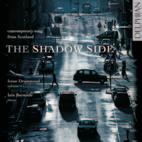
Irene Drummond soprano, Iain Burnside piano
DCD34099
For many years Irene Drummond has been the leading exponent of contemporary song in Scotland. With her partner Iain Burnside – peerless in this music – she offers a fascinating snapshot of her repertoire on this recording. From the rarified sparseness of James MacMillan, to the sustained luminosity of Paul Mealor, and the emotionally charged dramatic outbursts of John McLeod, The Shadow Side explores a world of halflights and visceral intensity.
‘A coherent collection, awesomely performed, and a landmark achievement by Paul Baxter’s record company, another national treasure.’
— The Herald, June 2011
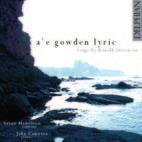
A’e Gowden Lyric: Songs by Ronald Stevenson
Susan Hamilton soprano, John Cameron piano
DCD34006
Susan Hamilton first performed the music of Ronald Stevenson as a treble in 1985, when she gave the first broadcast performance of A Child’s Garden of Verses on BBC Radio 3. Her unique, clarion voice inspired Stevenson to dedicate his May Songs for soprano and orchestra to her three years later. Since that early collaboration, she has brought Stevenson’s songs to audiences throughout Britain and abroad. Stevenson’s keen ear for setting Scots poetry in an original idiom is rooted in his pan-global approach to musical philosophy. He is as comfortable setting the words of Robert Louis Stevenson as he is the poetry of Tagore.
‘An astonishingly pure voice … the ringing accuracy of Hamilton’s intonation is a continual marvel … The recording is beautifully balanced and clear as a bell’ — International Record Review
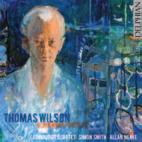
Thomas Wilson: A Chamber Portrait
Edinburgh Quartet, Simon Smith piano, Allan Neave guitar
DCD34079
Thomas Wilson was the leading light in a group of composers whose vision and technical assurance brought an international modernism into twentieth-century Scottish music. In the chamber works collected here, moments of extraordinary stillness release into fast, propulsive music whose compelling energies are matched by the players’ individual and collective virtuosity.
‘Delphian are to be warmly congratulated for bringing these tough but elegant, closely argued and well-crafted works to a wider public with superbly committed performances in vivid recordings’ — Tempo, October 2009
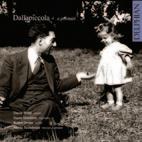
Luigi Dallapiccola: a Portrait
David Wilde piano, Susan Hamilton soprano, Nicola Stonehouse mezzo-soprano, Robert Irvine cello DCD34020
Luigi Dallapiccola is one of the most celebrated Italian composers of the twentieth century. This disc features chamber music and songs alongside his complete works for solo piano. Whether drawing on the music of the past to nourish the contrapuntal organisation of his own, or concentrating on the opportunities for gentle lyricism afforded by bell-like vocal and instrumental sonorities, Dallapiccola’s commitment to traditional expressive nuance has been seen by critics as a powerful aspect of his Italian insistence upon cantabilità – songfulness.
‘a marriage of discipline and imagination of which Wilde is fully aware … [Nicola Stonehouse] is eloquence itself in the Goethe-Lieder’ — Gramophone, April 2007
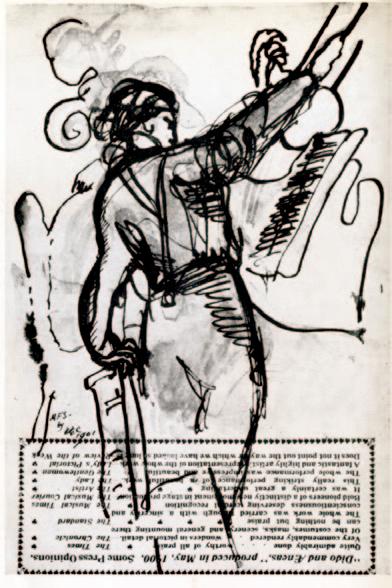
Left: Martin Shaw conducting. Drawing by E.G.C. on the back of a programme, 1901.
Opposite: Martin Shaw in mid-life in favourite countryman attire